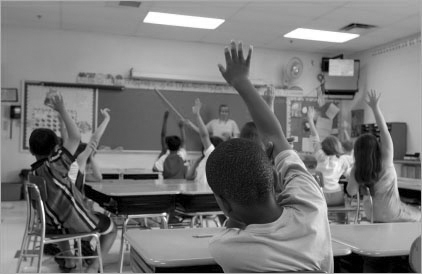
Children’s misbehavior should never be something they can’t recover from.
That was the overarching message I heard on a recent trip to meet with leaders and advocates from the Baltimore City School District. Thanks to a generous invitation from the League of Education Voters (LEV), I recently joined other education advocates, clergy, and LEV staff on a “scouting” mission to Baltimore.
About six years ago, Baltimore school leaders adopted the basic principle that student misconduct should never mean the end of a student’s education. They recognized that not only do suspensions and expulsions not work as a form of deterring future misconduct, but that these frequently spell the end of a student’s education. And they recognized what we know to be true in Washington: Students of color are suspended and expelled far more often and for longer periods of time than their white peers, even when they engage in the same conduct.
Baltimore decided to stop suspending and expelling students from school for most forms of misbehavior. While some students may need a break from a particular class or may need to be removed from their home school for a time, no one should lose their right to an education for breaking a school rule.
One of the most important steps Baltimore took was to replace harsh discipline practices with a restorative approach. This focuses on having students who misbehave take responsibility and make amends for their actions, through such means as apologizing or performing community service. Rather than simply punishing and ostracizing students through suspensions or expulsions, restorative discipline addresses the needs of all parties involved (victims, community, and offenders). And efforts are made to repair the situation and return the student back to their classroom.
LEV and the ACLU have been advocating for this approach here in Washington. What we learned from our visit to Baltimore was that if you have committed school leaders, sufficient support and training for your teachers, community groups in your corner, and lots of patience, incredible change can happen (and it doesn’t take a whole lot of money).
The results have been impressive. In the first year suspensions dropped by over 36%, and in the past six years suspensions have dropped 67%. This reduction has been accompanied by a 20% reduction in chronically absent students, improved graduation rates, and improved overall student performance and student conduct.
After the visit to Baltimore, I returned to Washington with a renewed conviction that we can make this happen here at home. Our school leaders are passionate, our teachers are innovative, and our communities are beginning to call for precisely the kind of change in discipline that we saw in Baltimore. Some already have started using alternative approaches to school discipline. All have seen the same positive results as Baltimore – suspensions are down, grades are up, and overall student behavior has improved.
The ACLU looks forward to continuing to work with LEV and others to see these alternatives to suspension and expulsions adopted by schools throughout Washington.




